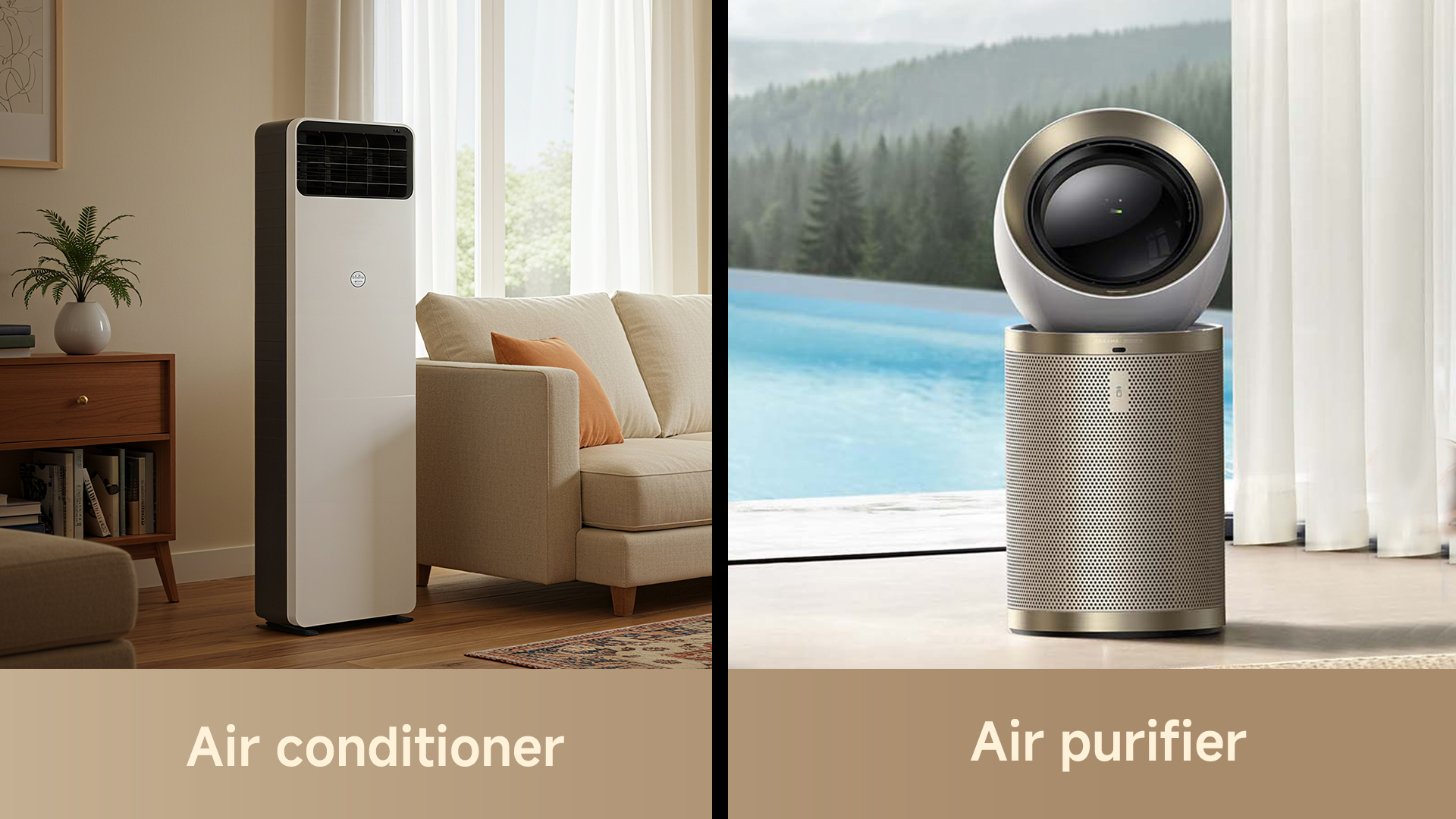
It’s a common question in the pursuit of a comfortable home: Should you get an air purifier or an air conditioner? While both appliances aim to improve your indoor environment, they do so in fundamentally different ways. It’s like comparing a robot vacuum and mop to a steam mop—both are essential for a clean home, but you can’t ask one to do the other’s job.
Simply put, they are specialized tools designed for different tasks. An air purifier sanitizes your air by removing harmful contaminants, while an air conditioner controls your climate by managing heat and humidity. They don’t compete; they complete each other. This guide will provide the clarity you need to choose the right solution for your home.
Table of Contents
- Performance Breakdown: Air Purifier vs. Air Conditioner
- How a Purifier Cleans Your Home’s Air
- How an Air Conditioner Manages Your Climate
- Can Your AC Filter Really Replace an Air Purifier?
- Final Verdict: How to Choose the Right Appliance for You
Performance Breakdown: Air Purifier vs. Air Conditioner
For those who want a quick answer, this direct comparison shows how each appliance handles common household issues.
| Problem / Need | Air Purifier | Air Conditioner |
| Allergies, Dust, & Smoke | Excellent. A True HEPA filter is specifically designed to capture microscopic airborne allergens like pollen, pet dander, and smoke particles. | Poor. Standard AC filters are not fine enough to trap the small particles that trigger most respiratory issues. |
| Excessive Heat & Hot Rooms | No Effect. A purifier circulates air at room temperature but has no cooling mechanism. | Excellent. This is its primary and most powerful function—to remove heat from a room efficiently. |
| Chemical Fumes & Odors (VOCs) | Excellent. Models with substantially activated carbon filters are designed to adsorb and trap gases, odors, and VOCs. | No Effect. An AC’s mechanical filter and cooling process do nothing to remove gaseous pollutants from the air. |
| High Humidity & Dampness | No Effect. A purifier does not change the moisture level in the air it cleans. | Excellent. Dehumidification is a natural and highly effective byproduct of the cooling process. |
As the table shows, each appliance is a clear winner for its specialized function. An air purifier is the undisputed champion of air quality, while an air conditioner is the only real solution for thermal comfort. However, some advanced models are starting to blur these lines. For example, a modern all-in-one like Dreame AirPursue PM20 brings year-round comfort in a single unit, so you breathe easier and feel better, faster. It integrates a heating function that can warm the air to 40°C in just 3 seconds, a powerful fan function with a 10-meter reach to circulate air, and a primary purification role to serve your needs in any season.
How a Purifier Cleans Your Home’s Air
A good purifier continuously circulates room air and removes what you can’t see: the tiny particles and gases that trigger allergies, irritate lungs, and leave rooms smelling stale.
Breathe Easy: Less Allergies, Dust, or Smoke
For many, the misery of allergy season, the constant sneezing from pet dander, or the lingering smell of wildfire smoke are unavoidable realities. This is precisely the problem a high-quality air purifier is built to solve. The hero of this technology is the True HEPA filter, which acts as a microscopic net to physically capture these tiny particle irritants. To meet the “True HEPA” standard, a filter must be certified to remove at least 99.97% of airborne particles at 0.3 microns—a size range that includes harmful PM2.5 pollution.
Advanced systems like the Dreame AirPursue PM20 take this even further, achieving 99.99% Filtration* with a sophisticated system of 4 layers for total protection. This powerful system proves its effectiveness in the real world by purifying a large area of 1,883 sq. ft. in just 15 minutes, ensuring the air in your entire living space is cleaned quickly and efficiently.
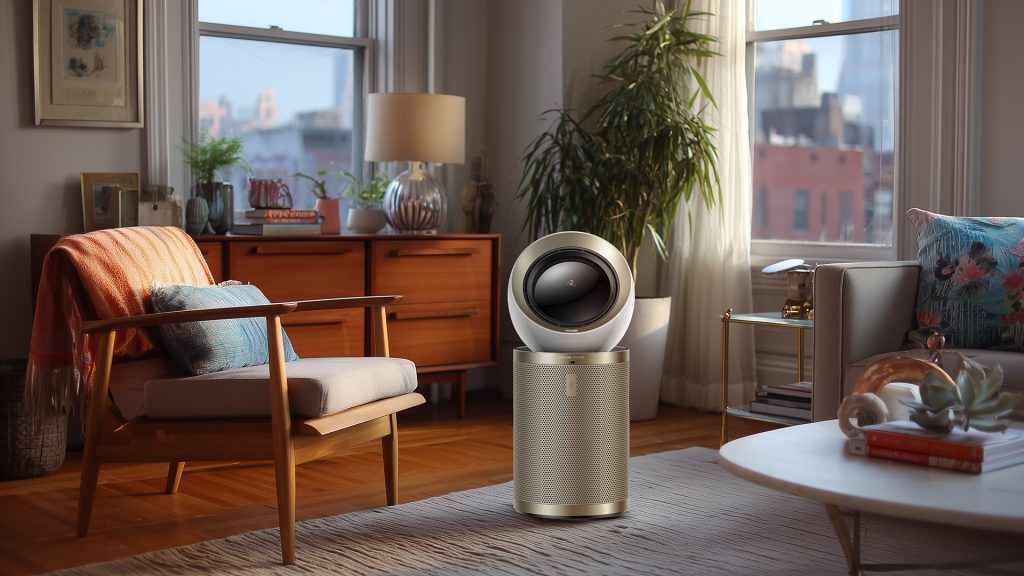
No More Lingering Odors and Chemical Fumes
Particles aren’t the whole story. Have you ever dealt with cooking smells that won’t go away, the chemical “new furniture smell” (known as VOCs), or persistent pet odors? These are gases, not dust, so you need an activated carbon filter. Think of it as a highly porous sponge for odors and chemicals; its immense internal surface area traps and neutralizes these annoying and potentially harmful molecules, leaving your air smelling fresh and clean.
A Safer Choice in Purification Technology
As you explore your options, it’s important to make a wise and safe choice. Some purifiers use “active” technologies like ionizers, which attempt to alter pollutants chemically. However, these methods can sometimes produce harmful byproducts like ozone, a known lung irritant. The combination of passive filtration—a True HEPA filter for particles and an Activated Carbon filter for gases—remains the safest, most proven, and most widely recommended method for truly cleaning your home’s air.
How an Air Conditioner Manages Your Climate
An air conditioner provides a tangible feeling of comfort and safety by tackling the environment itself. Many people think an AC “creates cold,” but it’s more accurate to call it a powerful “heat mover.” It uses a clever thermodynamic cycle to pull heat and humidity from inside your home and transfer it outdoors, leaving you with a comfortable indoor climate.
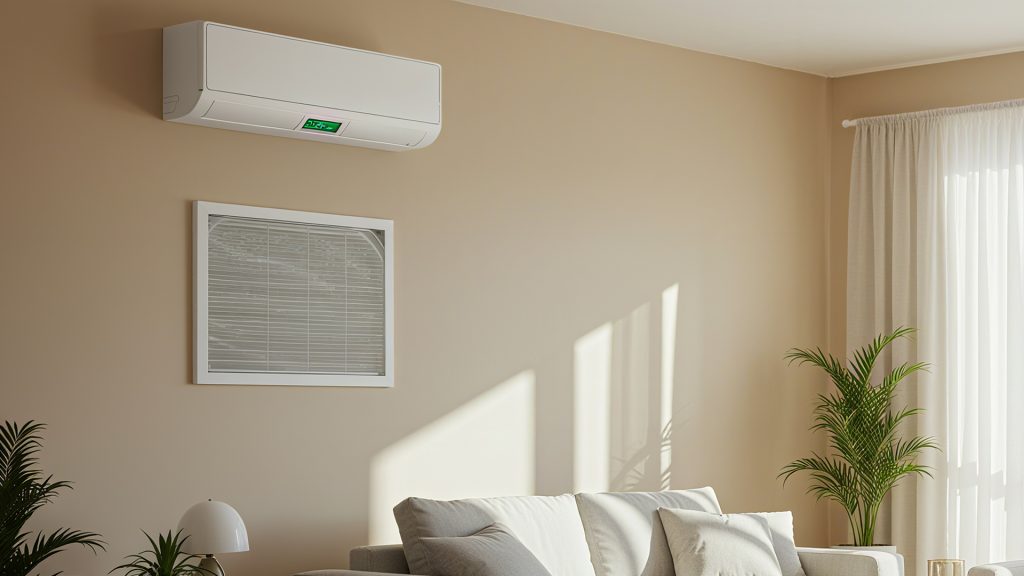
Provide Cool Relief from Unbearable Heat
During a sweltering summer heatwave, a hot and unsafe room can feel unbearable. The primary benefit of an air conditioner is its ability to create a cool, comfortable zone where you can relax and feel safe from the oppressive heat. It achieves this by circulating a special refrigerant through a closed loop. Inside your home, this refrigerant absorbs heat from your air, and outside, it releases that heat. This highly efficient process of heat transfer is what allows an AC to maintain a precise and comfortable temperature.
Fight That ‘Sticky’ Feeling by Removing Humidity
Sometimes, the humidity can feel worse than the heat itself. That heavy, “sticky” feeling in the air is a common complaint in many climates. Here, an air conditioner provides a second, powerful benefit: dehumidification. It is important to distinguish this from a humidifier, which adds moisture to the air. An AC is a natural dehumidifier and a key tool in preventing the growth of mold and mildew. Just as water droplets form on the outside of a cold glass, moisture from your air condenses on the AC’s coils and is drained away, reducing that muggy feeling and creating a crisp, comfortable environment.
Can Your AC Filter Really Replace an Air Purifier?
This is a common question, and the short answer is no. While it seems logical that an HVAC system could act as a whole-home purifier, it falls short for three key reasons:
- They use different tools for different jobs. Your AC’s filter (rated on a MERV scale) is primarily designed to protect the machine’s internal parts from large dust. An air purifier’s True HEPA filter is a much denser, healthcare-grade standard designed specifically to protect your lungs by capturing microscopic particles like allergens, viruses, and smoke.
- Your AC isn’t always working. Your air conditioner only filters the air when the cooling system is actively running. The rest of the time, filtration stops completely. In contrast, an air purifier is designed for continuous, 24/7 operation to constantly keep the air clean. A common question is whether air purifiers use a lot of electricity, but modern, energy-efficient models are designed for this constant use without a major impact on your utility bill.
- Using a powerful filter can damage your AC. Putting a dense, HEPA-style filter in an AC system that isn’t built for it can be counterproductive. It can severely restrict airflow, which strains the fan motor, leading to poor cooling, higher energy bills, and potentially costly breakdowns.
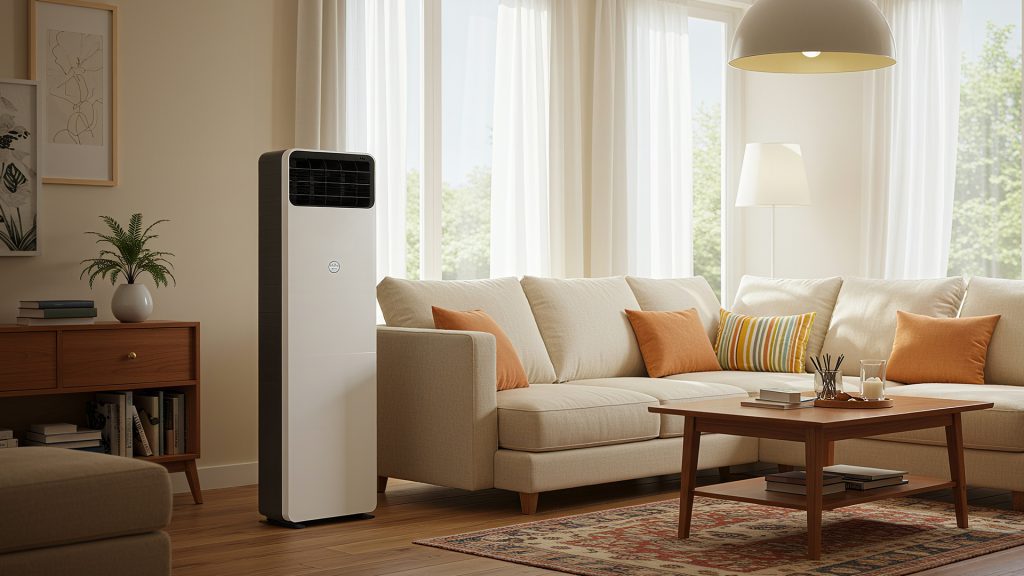
Benefits of Using an Air Purifier and AC Together
While an AC isn’t a substitute for a purifier, it’s the perfect partner. Here’s how they work in synergy:
- The AC creates a sealed, controlled environment. When your air conditioner is running, your windows and doors are closed. This drastically reduces the amount of new outdoor pollutants like pollen entering your home, giving the air purifier a huge head start to efficiently clean the air already inside.
- They deliver total indoor comfort. Using both devices is the ultimate strategy for complete indoor environmental quality. The AC tackles thermal comfort by controlling heat and humidity, while the air purifier tackles respiratory comfort by removing allergens and irritants. Together, they create a truly clean and comfortable living space.
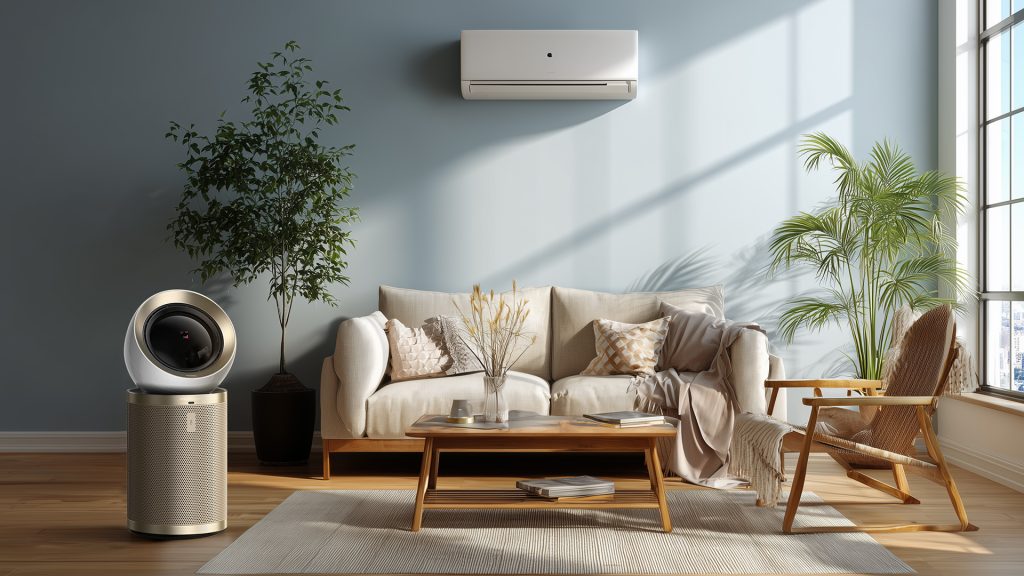
Final Verdict: How to Choose the Right Appliance for You
Now that you understand the distinct roles of each appliance, you can make a confident decision based on your primary needs. The general benefits of air purifiers are clear, but your specific situation will determine the right choice.
Prioritize an Air Purifier if You…
- Suffer from allergies, asthma, or other respiratory issues.
- Have pets that shed dander.
- Live with a smoker or are concerned about wildfire smoke.
- Are you worried about odors or chemical fumes (VOCs) from new furniture, paint, or renovations?
Prioritize an Air Conditioner if You…
- Live in a climate with hot and humid summers.
- Your main goal is to prevent heat-related illness for vulnerable family members.
- You struggle with sleep quality due to a hot bedroom.
The Case for Getting Both…
For those who want a complete solution for both health and comfort, using both appliances is the ideal strategy. By letting each machine do its specialized job, you create an indoor environment that is both comfortable and truly clean. If you’ve decided a purifier is right for you, the next step is to learn how to choose an air purifier for your home in 2025.